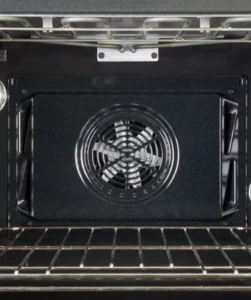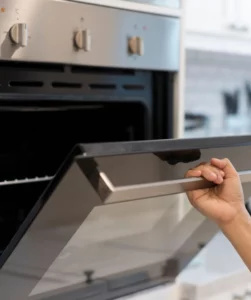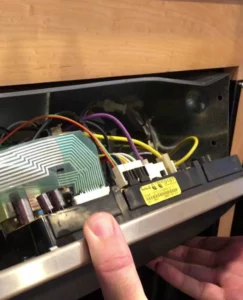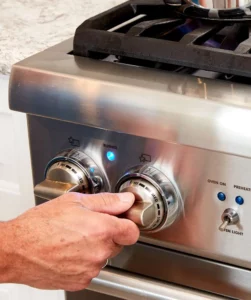Troubleshooting Oven Noises: Causes and Solutions
Is your oven making noise that’s driving you crazy? We understand how frustrating it can be to have a peaceful kitchen suddenly disrupted by strange and irritating sounds coming from your oven. But fear not! In this comprehensive guide, we will help you uncover the reasons behind those pesky oven noises and provide practical solutions to put an end to them.
Understanding Strange Oven Noises
It’s not uncommon for ovens to emit a variety of sounds while in operation. Some of these oven noises may include oven making clicking noise, oven beeping, oven making buzzing noise, and many others. These unexpected sounds can cause concern and disrupt your cooking experience. However, each noise can signify different underlying issues in your oven.
Boom! — Dirty Gas Igniters
A loud booming noise can startle even the most seasoned cooks. If you hear a sudden boom from your oven, it might be due to dirty gas igniters. Gas ovens use igniters to light the burner, and when they become clogged with dirt or debris, they may struggle to ignite the gas properly, resulting in that alarming noise.
To address the booming noise caused by dirty gas igniters, follow these cleaning steps:
-
Make sure the oven is switched off and unplugged to avoid accidents.
-
Locate the gas igniters, usually found at the back of the oven or near the burners.
-
Carefully remove the gas igniters from their position.
-
Clean the igniters with a soft brush or a cloth, ensuring all debris is removed.
-
Reinstall the gas igniters properly, and you should notice the noise diminish.
Vibration — Loose Convection Impeller Fan
A constant vibration coming from your oven can be both distracting and concerning. This noise is often caused by a loose convection impeller fan. The convection fan circulates hot air throughout the oven, and when it becomes loose, it can create a vibrating sound that resonates throughout the appliance.
To check if the loose convection impeller fan is causing the vibrations, follow these steps:
-
Turn off the oven and unplug it for safety.
-
Locate the convection fan inside the oven. It is usually at the back.
-
Gently wiggle the fan to see if it moves loosely.
-
If you notice any movement, the fan needs tightening or, in some cases, replacement.
A loose convection fan can lead to uneven cooking and potential damage to other components. If not addressed promptly, the vibration may worsen over time, leading to more significant issues with your oven.
Rattling — Loose Body Panels
Does your oven sound like it’s having a rattle party? Loose body panels might be to blame. Over time, the panels on your oven can loosen due to regular use or even from accidentally bumping into the appliance. The rattling noise can be annoying and may worsen over time if not addressed promptly.
To fix the rattling noise caused by loose body panels, follow these steps:
-
Make sure the oven is switched off and unplugged for safety.
-
Carefully examine the oven’s exterior for any visibly loose panels.
-
Gently push on the panels to secure them back in place.
-
Similarly, check the oven door hinges for any looseness and tighten them if necessary.
Rattling panels not only affect the aesthetics of your oven but can also lead to heat loss and uneven cooking. Ensuring all panels are secure will not only eliminate the rattling noise but also improve your oven’s performance.
Whirring — Broken Mechanical Timer
A gentle whirring sound is usually associated with the mechanical timer in your oven. If this timer gets damaged or worn out, it can produce an annoying whirring noise whenever you set it. This noise may not be as alarming as others, but it can still disrupt your cooking routine and lead to inaccurate timing.
A faulty timer can cause your oven to shut off unexpectedly or fail to notify you when your food is ready. To address the whirring noise caused by a broken mechanical timer, consider repairing or replacing the faulty timer. Consult your oven’s manual or seek professional assistance to ensure the replacement process is done correctly.
 Squeaking — Faulty Cooling Fan
Squeaking — Faulty Cooling Fan
A squeaking noise can be incredibly grating, especially when it persists during baking sessions. One of the common culprits is a faulty cooling fan. The cooling fan helps regulate the oven’s temperature, and when it malfunctions, it can produce that irritating squeak. This noise can be especially frustrating as it affects the ambiance of your kitchen.
To resolve the squeaking noise related to the cooling fan, follow these steps:
-
Turn off the oven and disconnect it from the power source.
-
Locate the cooling fan, usually found at the back or the top of the oven.
-
Spin the fan manually to see if it rotates smoothly.
-
If it grinds or squeaks, it’s time to lubricate or replace the cooling fan.
A squeaky cooling fan not only affects the noise level in your kitchen but can also disrupt the even distribution of heat, leading to uneven cooking results. Properly lubricating or replacing the cooling fan will restore its functionality and eliminate the annoying squeaking noise.
Popping — Electrical Issues
An oven making popping sounds could indicate electrical issues. This is a serious matter, and you should address it promptly to avoid potential hazards. Popping noises may occur due to faulty wiring or electrical connections, and they should never be ignored.
If you experience any popping noises from your oven, take these precautions:
-
Turn off the oven immediately and unplug it from the power source.
-
Do not attempt to use the oven until the electrical issue has been resolved.
-
Contact a qualified technician to inspect and repair the oven’s electrical components.
Electrical issues can lead to more significant problems if not addressed promptly. Safety should always be a top priority, and any concerns related to electrical components should be handled by a trained professional.
Identifying the Source of Noise
Now that we’ve pinpointed the possible causes of the oven noises let’s dive into the process of identifying the source:
Examining the Loose Impeller Fan
The convection impeller fan is responsible for circulating hot air within the oven, ensuring even cooking. If this fan becomes loose, it can create vibrations that resonate throughout the appliance, resulting in annoying noise.
To check if the loose convection impeller fan is causing the vibrations, follow these steps:
-
Turn off the oven and unplug it for safety.
-
Locate the convection fan inside the oven. It is usually at the back.
-
Gently wiggle the fan to see if it moves loosely.
-
If you notice any movement, the fan needs tightening or, in some cases, replacement.
Inspecting the Cooling Fan Functionality
The cooling fan is responsible for regulating the oven’s temperature and preventing overheating. A faulty cooling fan can cause squeaking noises, disrupting the ambiance in your kitchen.
To address the squeaking noise related to the cooling fan, perform the following inspection:
-
Turn off the oven and disconnect it from the power source.
-
Locate the cooling fan, usually found at the back or the top of the oven.
-
Spin the fan manually to see if it rotates smoothly.
-
If it grinds or squeaks, it’s time to lubricate or replace the cooling fan.
 Checking for Loose Oven Panels and Hinges
Checking for Loose Oven Panels and Hinges
Loose oven panels can lead to rattling noises as the appliance vibrates during operation. Loose hinges can also cause misalignment, affecting the oven’s performance.
To fix this issue, follow these steps:
-
Make sure the oven is switched off and unplugged for safety.
-
Carefully examine the oven’s exterior for any visibly loose panels.
-
Gently push on the panels to secure them back in place.
-
Similarly, check the oven door hinges for any looseness and tighten them if necessary.
A well-maintained oven with secure panels and hinges not only eliminates rattling noises but also ensures proper heat retention and cooking performance.
Troubleshooting the Lock Assembly
A malfunctioning lock assembly can lead to beeping noises and error codes on your oven’s display. The lock assembly is responsible for securing the oven door during the self-cleaning cycle and may malfunction due to wear and tear.
Here’s what you can do:
-
Ensure the oven is turned off and unplugged for safety.
-
Locate the lock assembly, typically positioned on the oven door or control panel.
-
Check for any visible damage or obstructions.
-
If everything looks fine, try resetting the lock assembly as per your oven’s manual.
If resetting the lock assembly doesn’t resolve the issue, consider seeking assistance from a professional technician to diagnose and fix the problem.
Cleaning the Gas Igniters
Dirty gas igniters can lead to booming noises in your oven. These igniters are responsible for lighting the burner and igniting the gas to provide the necessary heat for cooking.
To address the booming noise caused by dirty gas igniters, follow these cleaning steps:
-
Make sure the oven is switched off and unplugged to avoid accidents.
-
Locate the gas igniters, usually found at the back of the oven or near the burners.
-
Carefully remove the gas igniters from their position.
-
Clean the igniters with a soft brush or a cloth, ensuring all debris is removed.
-
Reinstall the gas igniters properly, and you should notice the noise diminish.
Resolving Oven Noise Problems
Now that we’ve identified the sources of the noises and performed the necessary inspections let’s move on to resolving the issues:
Tightening Loose Components
Loose components like the impeller fan and oven panels can cause various noises in your oven. Tightening these affected parts should do the trick and reduce or eliminate the noise.
To tighten loose components:
-
Make sure the oven is switched off and unplugged.
-
Identify the components that are causing the noise, such as the impeller fan or loose panels.
-
Use appropriate tools to tighten the components securely.
-
Double-check that everything is properly fastened before turning the oven back on.
Tightening loose components not only resolves the noise issues but also ensures better cooking performance and energy efficiency.
 Repairing or Replacing Faulty Parts
Repairing or Replacing Faulty Parts
In some cases, the oven noise may be a result of faulty or malfunctioning parts. For instance, a faulty cooling fan, mechanical timer, or lock assembly can create unwanted noises. If you identify any of these parts as the source of the noise, consider repairing or replacing them.
Before attempting any repairs, ensure you have the necessary knowledge and skills. If you’re unsure about the process, it’s best to seek the help of a qualified technician. Using genuine replacement parts is essential to ensure proper functionality and avoid further issues.
Lubricating Squeaky Components
Squeaky components, such as the cooling fan, can be annoying and disrupt the peaceful ambiance in your kitchen. In many cases, a simple solution is to apply lubricant to the squeaky parts.
To lubricate squeaky components:
-
Turn off the oven and unplug it for safety.
-
Identify the squeaky components, such as the cooling fan or other moving parts.
-
Use a food-safe lubricant recommended by your oven’s manufacturer.
-
Apply the lubricant to the squeaky parts as per the manufacturer’s instructions.
-
Test the oven to ensure the noise has been eliminated.
Addressing Electrical Issues
Electrical issues can be dangerous and should never be ignored. If your oven is making popping noises or displaying other electrical-related problems, take the following steps:
-
Turn off the oven immediately and unplug it from the power source.
-
Do not attempt to use the oven until the electrical issue has been resolved.
-
Contact a qualified technician to inspect and repair the oven’s electrical components.
Electrical issues can result from faulty wiring, loose connections, or other electrical malfunctions. A professional technician will have the expertise to diagnose the problem and ensure the safe repair of your oven.
Strange noises emanating from your oven can be bothersome, but they are not insurmountable. By understanding the various causes and following the troubleshooting steps provided, you can identify the source of the noise and implement the appropriate solutions. Whether it’s tightening loose components, lubricating squeaky parts, or seeking professional help for electrical issues, rest assured that a quieter and more peaceful kitchen is within your reach. Happy cooking!
